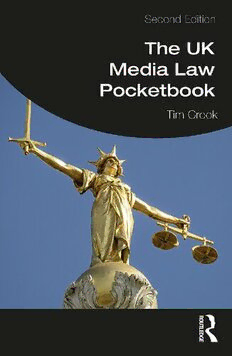
The UK Media Law Pocketbook PDF
Preview The UK Media Law Pocketbook
THE UK MEDIA LAW POCKETBOOK The second edition of The UK Media Law Pocketbook presents updated and extended practical guidance on everyday legal issues for working journalists and media professionals. This book covers traditional print and broadcast as well as digi- tal multimedia, such as blogging and instant messaging, with clear explanations of new legal cases, legislation and regulation, and new chapters on freedom of information and social media law. Links to seven new online chapters allow readers to access all the most up-to- date laws and guidance around data protection, covering inquests, courts-martial, public inquiries, family courts, local government, and the media law of the Channel Islands and the Isle of Man. Tim Crook critically explores emerging global issues and proposals for reform with concise summaries of recent cases illustrating media law in action, as well as tips on pitfalls to avoid. The UK Media Law Pocketbook is a key reference for journalists and media workers across England, Wales, Scotland, and Northern Ireland. The book’s companion website provides downloadable sound files, video summaries, and updates all the developments in one of the most dynamic and rapidly changing fields of law. Visit https:// ukmedialawpocketbook.com. Tim Crook, LLB, LLM, PhD, founded and taught media law at Goldsmiths, University of London for 30 years; advises and provides media law teaching material to the UK Broadcast Journalism Training Council; has been President of the Chartered Institute of Journalists and continues as Chair of the Institute’s Professional Practices Board. THE UK MEDIA LAW POCKETBOOK SECOND EDITION Tim Crook Designed cover image: George Clerk/E+ via Getty Images Second edition published 2023 by Routledge 4 Park Square, Milton Park, Abingdon, Oxon, OX14 4RN and by Routledge 605 Third Avenue, New York, NY 10158 Routledge is an imprint of the Taylor & Francis Group, an informa business © 2023 Tim Crook The right of Tim Crook to be identified as author of this work has been asserted in accordance with sections 77 and 78 of the Copyright, Designs and Patents Act 1988. All rights reserved. No part of this book may be reprinted or reproduced or utilised in any form or by any electronic, mechanical, or other means, now known or hereafter invented, including photocopying and recording, or in any information storage or retrieval system, without permission in writing from the publishers. Trademark notice: Product or corporate names may be trademarks or registered trademarks, and are used only for identification and explanation without intent to infringe. First edition published by Routledge 2013 British Library Cataloguing-in-Publication Data A catalogue record for this book is available from the British Library ISBN: 978-1-138-30915-9 (hbk) ISBN: 978-1-138-30916-6 (pbk) ISBN: 978-1-315-14328-6 (ebk) DOI: 10.4324/9781315143286 Access the companion website: https://ukmedialawpocketbook.com Typeset in Bembo by SPi Technologies India Pvt Ltd (Straive) CONTENTS Introduction 1 1 Media Contempt and Reporting Crime 3 2 Guide to Court Reporting – Key Facts and Checklist 69 3 Libel, Privacy, Accuracy and Balance 95 4 News Gathering, Story Finding and Public Interest 148 5 Protecting Children 169 6 Copyright and Intellectual Property 184 7 Laws and Rules for Elections and Politics 195 8 The Secret World 204 9 Scottish and Northern Irish Differences and Issues 216 10 Freedom of Information 225 vi CONTENTS 11 Social Media Law 252 12 Further Online Chapters 267 Index 270 INTRODUCTION This book is intended to be a concise, short, and clear quick guide to media law affecting anyone working in the UK. It comes with a companion website that updates an unstable and quickly changing area of the law and includes sound podcasts and video-casts. It is designed for people who work in traditional print, broadcast, or online multimedia. There are direct links to more information and key sources. There are two new printed chapters: Chapter 10 is on the Freedom of Information Law, and Chapter 11 is on social media law. Chapter 12 provides direct links to the companion website for chapters on reporting local government and access to meetings, cov- ering inquests; covering public inquiries; reporting courts-martial; reporting the family courts; media law of British Isles jurisdictions of the Isle of Man and the Channel Islands; and data protection law for journalists. * A downloadable sound file on the introduction that seeks to explain the purpose and mission of the book. https:// soundcloud.com/comparativemedialaw/introduction-uk- media-law-pocket-book-2nd-edition-2022 DOI: 10.4324/9781315143286-1 2 INTRODUCTION Please understand that, beyond my control, online sites can change their links without notice. I will do my best to update these and new developments of UK Media Law via the companion website at https:// ukmedialawpocketbook.com/2021/12/02/new-developments- in-uk-media-law/. 1 MEDIA CONTEMPT AND REPORTING CRIME Key professional rules for reporting crime and covering criminal proceedings: • Laws that control communication to protect the right to fair trial (Article 6 of the European Convention on Human Rights [ECHR]) and the administration of jus- tice meaning criminal enquiries, litigation, and legal pro- ceedings at all levels; • Key issues to remember: substantial risk (timing and scale of publication) of serious prejudice (content of publica- tion) or impeding justice (disruption/impact on enquiry) applying from the time of arrest; • UK Supreme Court ruling in Bloomberg v ZXC in February 2022 means all crime suspects have a reasona- ble expectation of privacy before being formally charged with any offence. There may be very rare exceptions. Even if the police name a suspect on the record or off the record, take specialist legal advice before publish- ing. Qualified privilege for libel offers no defence. The situation follows case law developments in cases such as Richard v BBC 2018 and Sicri v Associated Newspapers 2020. The threshold of public interest to defeat this is so high in practice that it will most likely operate as a default position. This may end the ambiguity of UK broadcasters DOI: 10.4324/9781315143286-2
